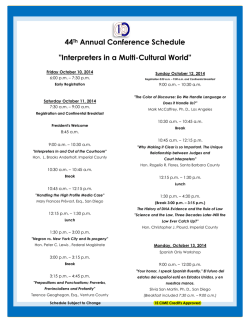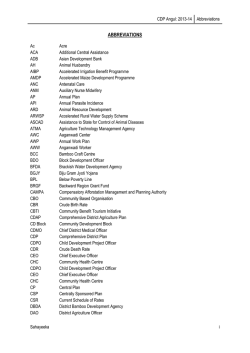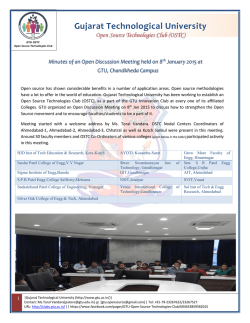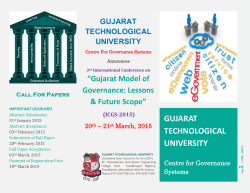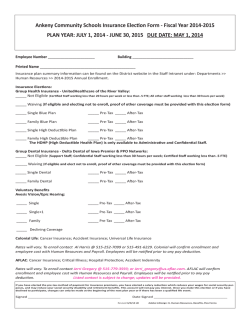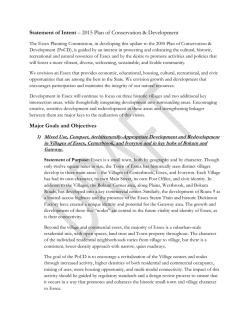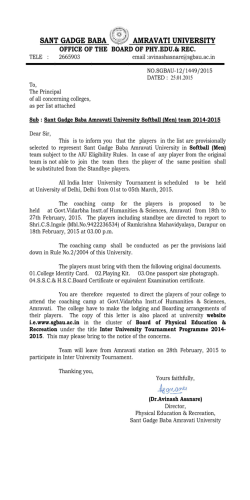
A Report on Felicitation Programme of Vishwakarma Yojana: Phase-II
Prepared By: Prof. (Dr.) Indrajit Patel & Mrs. Jagruti Shah Chandkheda, Ahmedabad Gujarat, India Smart Growth… Sustainable Development Better Villages Better Future.. Reimagine, Redesign & Rejuvenate Better Quality of Life… Rurbanization… Resource Utilisation... . Vishwakarma Yojana: Phase-II Built Environment… Reduce Urban Pressure... Village Development... A Report on Felicitation Programme of Event - Felicitation Programme of Students & Nodal officers of Vishwakarma Yojana: Phase-II Chief Guest - Shri Bhupendrasinhji Chudasma, Minister for Education, Higher &Technical Education Venue - GTU Chandkheda Campus Date - 31st December, 2014 Celebrating the success of the Vishwakarma Yojana: Phase-II Gujarat Technological University is privileged to lead the very important and most precious project of ‘Vishwakarma Yojana’ of the Department of Education, Government of Gujarat. Vishwakarma Yojana is a project framed to provide the benefits of real world experience to the engineering students and simultaneously apply their technical knowledge in the development of rural infrastructure with the aim of “Atma Gaon Ki Suvidha Shaher Ki”. As a part of Implementation of Vishwakarma Yojana Phase- II, the students of Engineering College affiliated with Gujarat Technological University have successfully completed the Techno Economic survey and Detail Project Report of 187 villages. The project is undertaken on “Design to Delivery basis”. For appreciating and recognizing all the participants who have contributed their valuable services to Vishwakarma Yojana Phase-II, Gujarat Technological University had organized a Felicitation Programme on 31st December, 2014. The Dignitaries on the Dias The Chief Guest of this program was Shri Bhupendrasinh Chudasma, Minister for Education, Higher & Technical Education, Law and Judiciary, Food & Civil Supplies, Consumer affairs, Panchayat, Rural Housing and Rural Development, Government of Gujarat. Guest of Honour, Shri D. A. Satya, IAS, Additional Development Commissioner, Panchayat, Rural Housing and Rural Development Department - Gujarat State, Hon’ble vice chancellor, Dr. Akshai Aggarwal, GTU, Shri J. C. Lilani, I/C Registrar & COE- GTU, Prof. (Dr.) Indrajit Patel, Hon’ble Director – Vishwakarma Yojana had graced the event with their presence on the dias. Mrs. Aggarwal, Deans, Deputy Directors, Project coordinator, OSDs, 236 Students & 38Nodal officers (from respective Degree & Diploma Institutes of Phase-II)had graced the event with their presence to celebrate the success of Vishwakarma Yojana: Phase-II. Inaugural Session Mrs. Almas Juneja had welcome all on behalf of Gujarat Technological University. All dignitaries on the Dias & off the Dias had joined for lightning of the lamp as per our Indian tradition. Floral welcome was done by Mrs. Agrawal for all the dignitaries. Welcome & Wishes Shri J. C. Lilani welcome all on behalf of GTU. He said that “Everyone knows that GTU is today the best & largest university of Gujarat.” He said that Vishwakarma Yojana was very important project for GTU and strong platform for all students of GTU to get real world experience & practical knowledge. In Phase-II, students had submitted detailed project report of 187 villages which are ‘Design to Delivery’ reports. These reports will be submitted to respective district development officers for direct action for the development of villages. He was happy to share that in the current academic year also maximum Degree engineering colleges & Polytechnic have been involved to cover more than 455 villages of 28 districts under Rural Infrastructure Development Projects. He acknowledged the remarkable work & efforts of all students under the guidance of nodal officers. He had given best wishes to all and wished Vishwakarma Yojana for best solution of village development & Rurbanization. Dr. Indrajit Patel welcomed all and appreciated the commitments & efforts of the team of VY for successful completion of Vishwakarma Yojana: Phase-II. He addressed that about 70% of its population lives in villages, scattered all over the country like stars in the night sky and about 96% of India’s geographical area is covered by villages. The vast majority of India living in rural areas cannot be taken lightly in any planning aimed at socio-economic development of the country. He said that today, Gujarat is a model state when it comes to initiatives in rural development. Hon’ble Chief Minister’s vision and leadership has made it possible for Gujarat to not only attract industries and investments, but has also led to an improved quality of life in rural areas. He added that the Rural Development schemes in Gujarat deal with subjects as diverse as rural housing and employment, forestation, grievance redressal, sanitation, cleanliness and promotion of peace and neighborhood. He said that the Vishwakarma Yojana is implemented by the Gujarat technological university in the year May-2012 under the able, dynamic & visionary leadership of Hon’ble Vice Chancellor Dr. Akshai Aggarwal. “Developing village with a ‘rural soul’ but with all urban amenities that a city may have” to fulfil this objective in 187 villages from 28 districts of Gujarat state, 759 students from 23 degree engineering college & 26 polytechnic colleges under the guidance of 61 nodal officers have been given their technical input as per the need of the village in particular includes, Physical infrastructure facilities (Water, Drainage, Road, Electricity, Solid waste Management, Storm Water Network, Telecommunication & Other), Social infrastructure facilities (Education, Health & Sanitation), Socio- Cultural (Community Hall, Library, Recreation Facilities & other) Sustainable infrastructures (Rain water harvesting, Biogas plant, Solar Street lights, Eco sanitation, Waste to Energy & Other) Repair & Maintenance of Public Buildings for overall development of villages which can help in developing villages in sustainable manner and reduce migration from villages and prevent the cities from the urban pressure. He added the major highlights of Phase-II: Orientation programs to understand the aim, objectives and scope of the Vishwakarma Yojana have been organized in all the zones In this phase, Techno Economic survey of the villages have been conducted in detail and included all the essential parameters to make Rurban village. VY website became research tool for the students to give their best input for the village development in this phase. Sustainable design phase has included designs like Rain water harvesting systems, Public toilet block with Biogas plant, Dry Compost Toilets, Eco Sanitations, various solar applications, waste to energy solutions, green technologies related to agriculture activities, pond beautifications and many more which will develop village in sustainable manner. For the successful completion of Vishwakarma Yojana and to give the essential technical knowledge in the rural infrastructure development, GTU has organized 6 Orientation Programs, 4 Implementation Meetings, 6 Technical Workshops and 2 brain storming session. Technical Workshop covered various technologies for sustainable planning, Design of Core infrastructure networks, Energy Audit & Electrification, and Reimagine & Redesigning of facilities. Primary Energy Audit for the public buildings of 97 villages has been performed and various solutions have been submitted to Sarpanches of respective village for efficient energy planning. More than four amenities have been designed for each respective village by the students which showcase the students’ hard work. Moreover interactive presentation in 143 villages in front of local authorities and village dwellers have completed in July 2014. The various designs such as Pond development, Community hall, Public toilet blocks, Gram panchayat building, Rain water harvesting systems on public buildings, Total solid & liquid waste management model and Low cost house have been already selected by village authorities and in few villages it’s implemented. Eventually he said that "The future of India lies in its villages”. Rural development implies both the economic betterment of people as well as greater social transformation. With time and experience, it is realized that accelerated and meaningful development can be achieved only if people of the grass root level are involved, “people’s participation” has become the keyword in rural development programmes. The participation of the people is necessary to provide the rural people with better prospects for economic development. Shri D. A. Satya, IAS, has initiated by giving example of Gujarat State Development Model. He shared his experience in the planning phases of village development and Rurban approach. How the Rural and Urban area are connected in context of development. He also briefed about the initiatives taken by government for rural development. He acknowledged the work done by the young technocrats and requested them to give their services in this manner for future development also. He appreciated team GTU for all the efforts put by them for village development. He requested students to prepare holistic plan for the villages for the sustainable future development. Hon’ble Vice chancellor Dr. Akshai Aggarwal to present the comprehensive report of Vishwakarma Yojana: Phase-I to Hon’ble Shri Bhupendrasinh Chudasamaji. Dr. Indrajit Patel, Mrs. Jagruti shah and Ms. Darshana Chauhan presented the comprehensive reports to the dignitaries on the Dias. Mrs. Almas invited Hon’ble Vice Chancellor, Dr. Akshai Aggarwal, the pioneer of Gujarat Technological University who has spent almost five decades in education, teaching and transforming young minds, both in Gujarat and abroad. She said that he believed that the tremendous power that today’s young minds have to create new ideas to solve the problems faced by the society, can transform the world. Hon’ble Vice Chancellor Dr. Akshai Aggarwal welcomed all. He said that initiatives like Vishwakarma Yojana can help build prosperous Gujarat. He added that VY has provided the benefit of professional work experience to the young budding technocrats of GTU. He said that any research work without direct relevance to the society will not normally lead to great Engineering Research. He said that by taking up their project under VY, a student is able to become both a good technologist as well as an agent of change for the better. For successful completion of Vishwakarma Yojana he congratulated Dr. Indrajit Patel, Mrs. Jagruti Shah, Ms. Darshana Chauhan, Nodal Officers and Students for their commitments, efforts and timely submissions. He also informed about planning of New Bridge course with the mission of 500 Institute: 500 Villages in which each institute affiliated with GTU will adopt one village. First year’s students from the beginning of the semester will be performing development activities for that respective village. Mrs. Almas thanked Hon’ble Vice Chancellor, Dr. Akshai Aggarwal for his motivational words, guidance and timely support. She invites Hon’ble Chief Guest Shri Bhupendrasinh Chudasama (Minister for Education, Higher & Technical Education, Law and Judiciary, Food & Civil Supplies, Consumer affairs, Panchayat, Rural Housing and Rural Development, Government of Gujarat) to share his view on this dual occasion. Shri Bhupendrasinh Chudasamaji welcomed one & all. He felt that Indian villages are not able to enjoy basic amenities, even after 67 years of independence. India is a vast country with a majority of its total population living in the villages. The Indian society is predominantly divided into two divisions like the rural society and the urban society. He summarized the vision of Hon'ble Prime Minister to reduce and remove the rural-urban divide through infusion of urban patterns and services in rural systems to ensure provision of quality lifestyles and livelihood options while keeping the basic rural soul intact. He was happy to say that GTU has taken a step forward to fulfill this vision. He said that Vishwakarma Yojana combines traditional knowledge and practices with modern technology. He appreciated the participatory process, used by the students to develop the DPRs. He acknowledged the team of Vishwakarma Yojana for the remarkable work for the community. He said that renewable sources of energy have to be tapped by India and he was pleased to learn that the students were learning about the use of renewable energy sources and rain water harvesting systems. He narrated the example of Lakhavad village from Palitana. The village dwellers generate Biogas for daily activities. Natural fertilizer generated from biogas plant was much cheaper than chemical fertilizers and can be better for the long-term health of soil. He presented the importance of rain water harvesting by giving example of Saputara hill station. He asked all teachers to work for making their students good human beings. He or she should understand their role and responsibility for society. He requested all to join hands and make our villages, cities, nation & earth a better place to live. Mrs. Almas thanked Hon’ble chief guest Shri Bhupendrasinh Chudasamaji for his words and gracious presence on the occasion. Ms. Darshana gave vote of thanks to one and all for making program huge success for Vishwakarma Yojana. Certificate Distribution Ceremony Token of appreciation was distributed to all the Students and Nodal officers for appreciating & recognizing for their contributions & support to Vishwakarma Yojana: Phase-II. Hon’ble Chief Guest Shri Bhupendrasinh Chudasamaji, Guest of Honour Shri D. A. Satya, Hon’ble Vice Chancellor Dr. Akshai Agrawal, Mrs. Agrawal, Shri J. C. Lilani, and Dr. Indrajit Patel presented certificate to all the students and nodal officers. Team of Vishwakarma Yojana: Phase-II Few Glimpses of Felicitation Programme: On Behalf of Vishwakarma Yojana, GTU Prof.(Dr.) Indrajit Patel Mrs. Jagruti Shah Ms. Darshana Chauhan
© Copyright 2026
